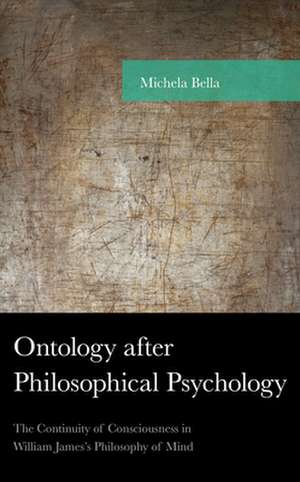ONTOLOGY AFTER PHILOSOPHICAL PCB: American Philosophy Series
Autor Michela Bellaen Limba Engleză Hardback – 20 aug 2019
Din seria American Philosophy Series
- 27%
 Preț: 794.48 lei
Preț: 794.48 lei - 23%
 Preț: 680.49 lei
Preț: 680.49 lei - 23%
 Preț: 638.18 lei
Preț: 638.18 lei - 27%
 Preț: 718.37 lei
Preț: 718.37 lei -
 Preț: 422.89 lei
Preț: 422.89 lei - 27%
 Preț: 685.32 lei
Preț: 685.32 lei - 27%
 Preț: 750.47 lei
Preț: 750.47 lei - 27%
 Preț: 816.71 lei
Preț: 816.71 lei -
 Preț: 399.79 lei
Preț: 399.79 lei - 23%
 Preț: 682.43 lei
Preț: 682.43 lei -
 Preț: 398.81 lei
Preț: 398.81 lei - 23%
 Preț: 684.80 lei
Preț: 684.80 lei - 23%
 Preț: 648.21 lei
Preț: 648.21 lei - 23%
 Preț: 685.39 lei
Preț: 685.39 lei -
 Preț: 459.88 lei
Preț: 459.88 lei - 23%
 Preț: 687.49 lei
Preț: 687.49 lei - 27%
 Preț: 788.38 lei
Preț: 788.38 lei - 23%
 Preț: 650.42 lei
Preț: 650.42 lei -
 Preț: 329.34 lei
Preț: 329.34 lei -
 Preț: 350.88 lei
Preț: 350.88 lei -
 Preț: 351.65 lei
Preț: 351.65 lei - 23%
 Preț: 586.04 lei
Preț: 586.04 lei -
 Preț: 362.75 lei
Preț: 362.75 lei - 23%
 Preț: 586.74 lei
Preț: 586.74 lei -
 Preț: 330.02 lei
Preț: 330.02 lei - 23%
 Preț: 556.84 lei
Preț: 556.84 lei - 23%
 Preț: 584.85 lei
Preț: 584.85 lei - 23%
 Preț: 588.42 lei
Preț: 588.42 lei - 23%
 Preț: 556.44 lei
Preț: 556.44 lei - 23%
 Preț: 619.15 lei
Preț: 619.15 lei - 23%
 Preț: 589.52 lei
Preț: 589.52 lei
Preț: 687.32 lei
Preț vechi: 892.63 lei
-23% Nou
Puncte Express: 1031
Preț estimativ în valută:
131.53€ • 142.83$ • 110.49£
131.53€ • 142.83$ • 110.49£
Carte tipărită la comandă
Livrare economică 22 aprilie-06 mai
Preluare comenzi: 021 569.72.76
Specificații
ISBN-13: 9781498560627
ISBN-10: 1498560628
Pagini: 292
Dimensiuni: 152 x 229 x 18 mm
Greutate: 0.57 kg
Editura: Rowman & Littlefield
Seria American Philosophy Series
ISBN-10: 1498560628
Pagini: 292
Dimensiuni: 152 x 229 x 18 mm
Greutate: 0.57 kg
Editura: Rowman & Littlefield
Seria American Philosophy Series
Notă biografică
Michela Bella is postdoctoral researcher at Université de Nantes.
Descriere
Ontology after Philosophical Psychology develops a theoretical and historical analysis of William James's psychology of the stream of consciousness and its connections with his philosophy of radical empiricism. This context enables a fuller understanding of James's epistemological effort to deal with science, as well as his pluralistic metaphysics.
